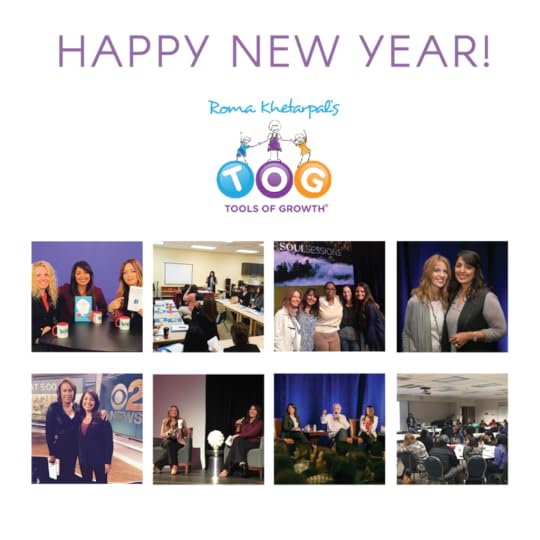Roma Khetarpal's Blog, page 16
March 28, 2017
Are You Being Consistent with Your Kids?
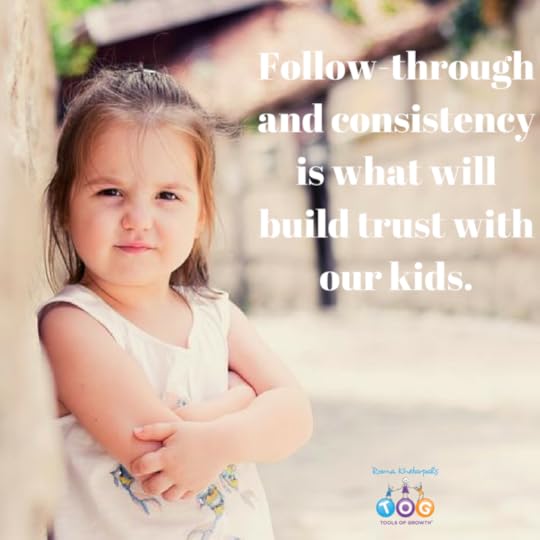
Parents in my Happy, Relaxed Parenting classes frequently express the same lament: Follow-through is one of their biggest challenges, and more often than not, kids pick up on that.
My sister, for example, was inconsistent with following through on her decisions and much to her dismay, she knew it. Her work schedule changed so often, it meant that each day was also different for her kids. One morning, as she was driving the kids to school, her personal “pinch point” manifested itself as she overheard her kids whispering in the backseat. her five-year-old, who had seen the iPod in his seven-year-old brother’s backpack, said quietly, “You’ll get into trouble -Mom grounded you from your iPod until tomorrow!”
Their nine-year-old sister joined the conversation a bit more loudly. “Don’t worry,” she said, “Mom always forgets about the grounding by the next day.” Funny, but true for so many parents… and it made my sister realize she needed to be more consistent with the consequences she doled out.
Our children know our strengths and weaknesses just as well as we know theirs. If we don’t follow through on our word, they’ll learn exactly when and how to work around us. Following through and being consistent with our guidelines and groundings sends a clear message about consequences, just as we send a message about reliability when we promise something to our kids and we live up to it. In both cases, knowing that we will live up to our word builds trust between parent and child.
Parenting is a directorship, not a dictatorship. Our job is to direct our children toward right and wrong, not to dictate every action. If we direct them, we practice Honorable Parenting and Approachable Parenting, which will surely earn us their respect and their trust. However, if we dictate rules, we are doing a disservice to them and to ourselves. We are wasting our time and theirs by keeping them from being independent, and we will still carry the heavy baggage of guilt, doubt, fear, and worry. Most of all, we will drift further away from our larger goal of building a good relationship with them.
With our parenting world in constant flux, follow-through and consistency are among the most challenging tasks we encounter as parents. But our job is to do the best that we can, as often as we can – leaving room for mistakes and for growth from mistakes. There’s no reason to feel guilty about a mistake; guilt is unnecessary anger directed at ourselves, and it prevents us from learning. Reminding ourselves of that can help put it in perspective. Instead, take a deep breath and ask yourself the same thing you ask your kids: “What have I learned from this?”
The post Are You Being Consistent with Your Kids? appeared first on Tools of Growth.
March 15, 2017
Slime – Do You Know What Your Kids Are Playing With?
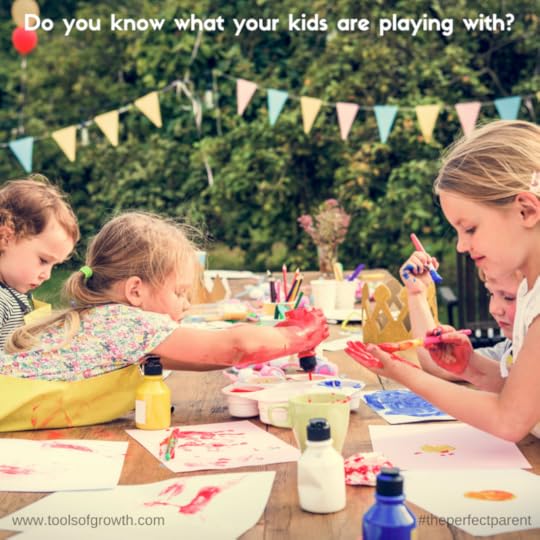
Guest post by Carolyn West of This Talk Ain’t Cheap.
Last week I wrote a blog post about the concerns I had with kids making slime at home.
In case you’re unfamiliar with this “plaything,” it’s a gooey, silky substance that kids like to roll in their hands because it feels good. They just hold it and squish it. But the ingredients they use to make it, and the way they combine different products made me question slime’s safety. My post went viral, and nobody was more surprised by that than I was. I was bombarded by people criticizing me for my post and accusing me of fear mongering and of not having any idea what I was talking about. But for every negative comment I received, there were hundreds of others from parents thanking me for shedding a light on this topic. It turns out there are many more kids out there having similar reactions to mine after playing with certain types of slime. Chemists and doctors shared their knowledge with me about the dangers of mixing chemicals and the fact that our kids are coming into contact with products that were never meant to be played with.
The fact is that although the FDA tells us a product is safe, it is our responsibility to use it for its intended purpose. We already know that each of us may react differently to substances in our environment. Some of us are allergic to pollen, grass, fruits, or nuts. Those reactions can range from itchy eyes to sore throats, or even death in connection with some types of peanut allergies. Life is hard enough without having to worry about our possible reactions to chemicals.
Traditional slime components like Borax and glue aren’t meant to be toys, but there are safe, food-based ingredients for our kids to use, and plenty of recipes for safer slime. There are some great ones online at Cool Mom Picks. I encourage you to check them out.
As a parent, I felt it was my responsibility to share my story and leave it up to you to decide what is best for your children. Our mission is to encourage our kids to create and experiment, as long as safety is a number-one priority. Please be aware of what your kids are playing with… even when those products are deemed “safe” to use.
The post Slime – Do You Know What Your Kids Are Playing With? appeared first on Tools of Growth.
March 6, 2017
How We Give Up On Our Kids Every Day
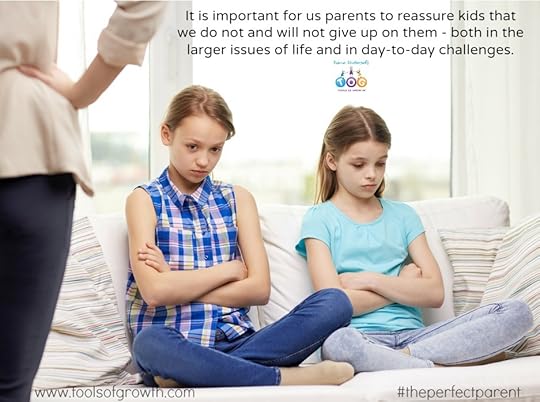
We have two close family friends who are traveling a rough road with their young adult children. One family is dealing with alcoholism, the other with drug addiction. As painful as this is for both families, there is an equal amount of resilience and hope. The parents are relentless in their support and refuse to give up on their kids.
This week, I saw something similar with my 80-year-old mother-in-law. She stood beside my sister-in-law, who was going through major heart surgery. Exhausted physically and emotionally, my mother-in-law remained strong for her daughter. Despite her physical limitations, she spent hours at the hospital sharing her love, care, courage, and strength. As my sister-in-law was being wheeled into surgery, my mother-in-law said, “It will be over before you know it. I have faith in you and will never give up on you. You need to have faith in yourself and never give up on yourself either. God is with you and so are we. You are strong and you will get through this.”
As parents, we are tenacious and dedicated when it comes to our children. When they are hurting and in pain, we never give up hope on our children, which would be like giving up on life itself. We are just not wired any other way. And yet why is it that this tendency to never give up on our kids is not evident in the day-to-day challenges that we face with them?
For example, when our kids mess up and make mistakes, we express our disappointment and disapproval ferociously. We say things like, “That’s it. I’m done with you.” Or “I’ve had it with you.” Or “You’re never going to learn, are you?”
When our kids get “bad” grades, these are the phrases that trip off our tongues:
“Another “C?” That’s it! I’m done spending money on tutors.” Or “You’ll never get past high school.”
Think about the underlying message we are sending to them with these statements. Any sentence that has a “That’s it. I’m done…” or “You’ll never…” gives voice to an underlying message: You can’t do this. I have given up on you. This is why children come back with, “You’re mean.” Or “you have no faith in me.” Or the one that hurts the most, “You’re never there for me.” Needless to say, that is far from our intention!
It is important for us parents to reassure kids that we do not and will not give up on them—both in the larger issues of life and in day-to-day challenges. This is what builds a parent-child connection and authenticates the relationship. This is also what builds our kids’ self-confidence and self-esteem. It is how we respond—not react — to our children’s daily mistakes that prepares them for real life. It is what they learn from the mistakes that facilitates growth and builds their grit.
Paul Tough, in his book How Children Succeed, ranks grit as one of the most important skills that contribute to character that parents can help their children build. This grit is strengthened when we embrace mistakes and harness teaching moments by responding with “I know this must be hard for you. How can I help you? I got your back.” Or “Let’s look at what you learned from this.”
It is up to us to create learning moments—regardless of any pitfalls. It is through these day-to-day challenges that we let our kids not just know but also feel that, indeed, we will never give up on them.
The post How We Give Up On Our Kids Every Day appeared first on Tools of Growth.
February 27, 2017
The Three Things We Will Never Know About Our Children
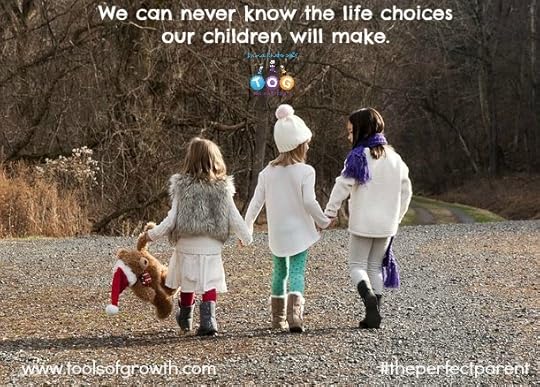
As I reflect back on the time and effort I put into parenting, I have to admit I never really knew what my children’s personalities would be like, what life choices they would make, or what they would choose to do for a living. Yet, in hindsight, I see that my husband and I carried a terrific burden, trying to mold their personalities, groom them to make the “correct” life choices, and pick a career path that we thought would be best for them.
With that in mind, let’s examine how much effort—and sometimes aggravation and emotional turmoil— we should invest in planning our children’s future.
We can never know the future personalities of our children. Surely, there are some predictable traits that we think our children will have for life. Wrong. My son, Navin, who was an extremely clean child—taking two or three showers a day —was also a very messy one. He would leave things around the house, his room was rarely picked up, and we constantly battled about that. When he moved home after graduation to join the family business, I was excited to have a child back, but I was equally concerned with the thought of going to war over his mess again.
Indeed, his habits hadn’t changed. For the first few weeks I would say things like, “Now that you’re an adult, I am concerned about how you will function in such a mess.” Or “How can you think clearly when everything is so messy?” Or “Your wife is going to beat you up if you don’t learn to pick up after yourself.” (I was careful, of course, never to use terms of separation like “This is my house, so my rules go.”)
My son’s response was always, “Please let it go, Mom. I’ll learn when the time comes. I’ll either do it or pay someone to do it.” But I was afraid that day would never come.
Last year, after living at home for three years, he bought his own place and moved out. I cringed at the thought of what his beautiful new place would look like in a week, but I reminded myself that it was not my business. He was a responsible 25-year-old. One month after he moved in, he hired the cleaning lady who had worked for me for several years for a monthly cleaning. She walked in one morning and said, “I cleaned Navin’s place yesterday, and I think you should know this.” I was sure that she was going to tell me how messy his house was. Instead she said, “No, it’s a good thing. His house is spotless—nothing lying around. No mess, no clothes on the floor, no dirty dishes. All I did was clean the bathroom and floors. Can you believe that?”
I was sure that this phase wouldn’t last long, and over the next few months, every time we stopped by his place, I expected a mess. But no, Navin has changed. He just isn’t a messy person anymore. Would I have ever imagined this? Never…in a million years!
I asked him recently what brought about this evolution. In a second he said, “Well, I wasn’t raised in a messy home, and now that I have mine, I like it to be clean.”
I think back now on all the time and energy I put into fighting over what I thought was an unchangeable personality trait. What a waste of time! Did Navin change because I let go, or did he need to pay for his space to start feeling a pride in ownership? I’ll never know. One thing became crystal clear though: Just do what you do best for you and let your kids be. Pick your battles wisely, parents.
We can never know the life choices our children will make. In high school my daughter, Nitasha, always talked about wanting to go to a university close to home. She wanted to be able to drive home over the weekend and visit with the family. And she said she would never leave sunny California to live on the cold East Coast. She even hated our occasional ski trips to the local mountains! Since our entire family—aunts, uncles, grandparents, cousins—live in Los Angeles, and there were umpteen choices of great schools between Orange County and our home in Valencia, I was sure that she would either be a commuter student or stay within a 60-mile radius of our home.
My son, on the other hand, wanted to go as far away from home as possible. He is an adventurous and fearless explorer, always looking for new experiences, and he wanted to live on the East Coast for a totally different experience.
So how did this all play out? For her undergrad education, my daughter ended up choosing Santa Clara University, a whopping 313 miles from home. For graduate school, she chose Boston, where she weathered two of the worst winters in the city’s history. My son, on the other hand, attended Chapman University—exactly 60 miles from home.
Could I have predicted this? Not in a million years! I asked my kids what the deciding factor was for them. They both said, “You and dad always told us, ‘Trust your intuition and the school that is right will show up for you. When timing is right, you will know.” I can’t tell you how many years we spent speculating, planning, and worrying about what schools our kids would end up in and how we could “set” things up for them. What guided them best was simple: Trust life and your intuition, and it’ll all turn out ok.
We will never know our children’s career paths. Nitasha claimed at five that she wanted to be a pediatrician. Always interested in the human body, at 12 she declared that she was going to be a thoracic surgeon. By the end of high school, after reflecting on the difficulties of being a doctor and raising a family—something that was always very important to her—she settled on the more practical choice of dentistry. “If I choose dentistry,” she would say, “I don’t have to work weekends and can still make time to attend my children’s school events and stay involved with the family.” As she came to the end of her undergraduate years, she applied to several dental schools and was accepted. During her last spring break before graduation, however, she came home and had a complete meltdown. She didn’t want to be a dentist anymore! She would be graduating with two majors—biology and finance—and was now leaning toward the business world. In fact, she ended up working in the family business for three years, filling our dire need for implementing new technology, and then decided to go on to graduate school, earning a Masters in Information Systems and Operations.
Right before graduation, just for fun, Nitasha attended a forum held by the Walt Disney Company, after which she got an invitation to apply to that company’s Technology Management Rotation Program. After three months of challenging interviews, she was offered a position that she quickly accepted.
From pediatrician to thoracic surgeon to dentist to technology. We would have never imagined that this is where she would end up. How did this happen? She says, “In our family, I’ve seen how wonderful it is to do what you love to do. I just followed my gut and ended up here. I’m so grateful that you and dad left me to decide what I wanted for myself.” We spent a lot of time, money, and effort helping her chart a career in the medical field. But somewhere along the line, she changed her mind, and all we did was support her choice.
There’s a fine line between planning for our children—projecting our vision of what they should be and the choices they should make—and trusting that what is right for them will show up if we simply are authentic and stay connected to ourselves.
Life seldom turns out as we had planned for it. Why should it be any different for our children? If we constantly, grow and change and evolve, so will they. Our job then is to simply allow for it. This is how we can nurture their spirit and support the life that is their own to live and the choices that are their own to make.
So where should we put our time and effort? Where should we invest our parenting intention and energy? There are only two answers:
Be the best authentic person that you can be. Not for them but for yourself. This authenticity and connection is what they will dial into. And it models a powerful life benefit to our kids!
Put aside what you want for your kids, and pay attention to what they want out of their lives. We need to focus on supporting them in their own metamorphosis rather than impose what we think we want them to become.
The post The Three Things We Will Never Know About Our Children appeared first on Tools of Growth.
February 23, 2017
5 Timeless and Necessary Life Values for Parents and Kids
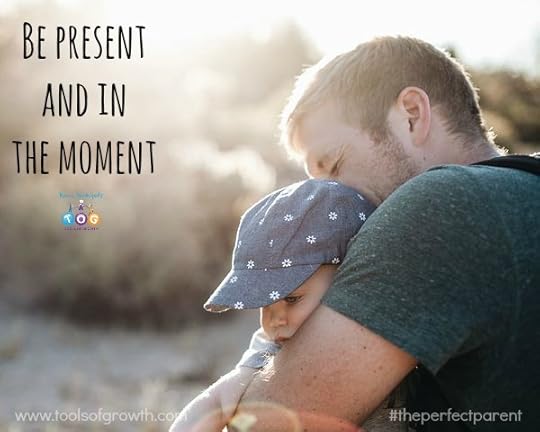
A friend of mine relayed a story that got me thinking:
Some years ago a man and his brother went to visit their grandfather in Kansas. They were helping him with his farm chores when a UPS truck pulled up with a mail order he had placed. One of the young men said, “Isn’t this amazing? Having delivery to your door! I remember when we were teenagers, you would leave early in the morning and drive six hours into town to pick your farming supplies and return the next day.
To this the old man responded, “And before you were born, I would ride 12 hours in my horse-drawn carriage, and the trip back and forth would take me four days. Yes, times have changed. I used to think it was important to teach kids how to drive my horse-drawn carriage. When cars came along, I thought it was important for them to learn to drive. Now I think that the most important value to teach our children is to be adaptable and grow with the times.”
How true that is! On hearing this story, I couldn’t help but ask myself, “What is it that we can teach our children now that will carry them through all of life’s changes? If change is the only constant, how do we equip our kids to keep up—to find fulfillment, joy and happiness through changing times?”
So what are those life skills or values that that will carry our kids, support them, and help them grow? Here are my top five:
Be present and in the moment. This is the foundation of meeting every life change and challenge. When we are in the now, we are focused on the task at hand. We are not worrying about how life was better or worse in the past or how it can be better or worse in the future. Yes, we must learn from the past and plan for the future, but we must leave some energy to enjoy the moment at hand.
There’s a difference between planning and living. Too often, when we are not focused on the moment, we are overwhelmed with planning and rethinking, with could’ve and should’ve. And sadly, we model this behavior to our children. Not only is this is a detrimental habit to pass along, but we are also missing out on important times with our kids.
Parents, we only get to do this once. So balance mundane daily, monotonous tasks with an equal dose of being present and rooted in the moment. This is the most important life-enhancing value we can teach our children. If you’re looking for ways to break existing habits, explore Take 5 : 5 minutes a day to do nothing, no-thing, with your kids. It’s a great way to live and learn in the moment.
Have faith in and stay connected to yourself. Most of our anxiety comes from our intense need to compare ourselves with others. We veer away from our own potential and enter a never-ending rat race of accomplishments. We also start our children very early on this track by getting caught up in schools they attend, grades, accolades, and degrees. Later we compare jobs, homes, cars, and so on. But this chase buys us neither happiness nor peace of mind. And we forget to explore who we are and what we love to do.
How then can we step off the hamster wheel and instill positive life values in our kids? By teaching them to have faith in themselves and to stay connected to themselves. This can only be done by raising them in a spirit-nurturing environment. That means asking: What am I good at? What comes to me naturally? What do I enjoy doing? We can then take the answers and use them to identify and strengthen weaknesses. Say a child is not good at math. Why not point out his or her strengths in science, art, or whatever and then help them cultivate a good attitude about passing the class and putting their best foot forward. Pushing will only make it worse. Your kids will lose faith in themselves, which will hurt their self-confidence and self-esteem, instead of helping them believe in themselves.
There is a world of a difference between being inspired by others and competing with them. The clearer we are about this as parents, the clearer our kids will be. The second most timeless and positive life value we give our children is to direct them inward—to their own potential, their gifts, and their self-understanding.
Stay rooted in oneness. How often do we tell our kids, “We are here for you…we are family,” and then say, “This is my house, and I make the rules.” In one breath we advocate values that unite the family, and in another we divide ourselves from our kids by claiming that the house that should be their safe space is really our territory. What mixed messages and what a disservice!
It is our responsibility to support oneness in all that we do for our children through our communication habits. Statements like “Well, that’s not how we do it,” or “I don’t care what Jeffrey is allowed to do” send a message of superiority and separation. Why not say, “Each family does it differently,” or “We all do what works best for us”? That can support your case without demeaning anyone else. Bringing oneness into the way we talk helps strengthen that concept for children. It is the opposite of bullying, being over competitive, or espousing racists views. We’re all human beings, and at our core we are the same. We are not separate from each other—different maybe but definitely not separate.
The oneness we practice with our kids at home is directly connected to building a united universe. When we stay rooted in this oneness, we are never alone, we are prepared and supported for any change we face—as a family, a community, a nation, and a world.
Know that all of life challenges us to grow. Often when we are hit with a trying situation—especially when it comes to our children—we shut down, crumble, or blow our fuse! We react as if the problem were the end of the world. When will we learn that this is part of the ride? How can we expect that any of us can go through life without being challenged? How silly is that! All of life is a challenge, and we know it. Yet we dive head first into emotional outbursts.
The next time we’re faced with some obstacle, we need to remember this: Behind every single trying issue there is a huge aha moment, an opportunity for learning. Go ahead…make a mistake, and allow your kids to do the same. Tell them not to be afraid of mistakes. Learning from mistakes is what makes us grow. When we are growing, we are experiencing; when we are experiencing, we are happier. When we can look at challenges as experiences and milestones to growth, we will look back at our lives as lives worth lived. Where’s the fun in saying, “I am the same as I was ten years ago. I haven’t grown at all.” If we want to thrive and not wither away, we must commit to growth, and that only comes with challenges. Know it, expect them, and be prepared for them. Understanding this prepares us and our children for any and every change that life throws our way.
Balance effort with letting go. I grew up hearing my favorite aunt’s words, “Do, do, do. Let go, go, go.” It used to confuse me, but now I get it! I’m a doer by nature, and my expectations followed right at the heels of my doing something. When my expectations weren’t met, I faced disappointment. My efforts felt like a waste of time. What a self-deprecating roller coaster I was on.
Then one day, as I was telling my aunt how hard I had worked at something and had gotten nothing in return, she said, “Did you do your best?” “Of course,” I responded. “Did it feel good?” “Of course,” I responded again. “Then, that’s it,” she said. “Find value in that, and move on. Do, do, do. Let go, go, go,” she reminded me.
As I started to practice that, I started to find more joy in everything that I did. The end result was not always getting what I expected, but I got better at everything I did, and the feeling was liberating.
When we shift our mind-set, we start to tap into the intention behind the doing. If my goal is to help my child with his biology midterm, then I let go of an expectation of his grade. As I practiced letting go, that attitude rubbed off on my son. When he got his grade, if it was a good one, we celebrated. If it wasn’t a good one, we looked back at it as effort well spent to learn the material.
I’ve applied the same principle to changing my career and writing my first book. I do my best at pursuing opportunities that come up and consider it a call to serve, apart from any results. Focusing strictly on my intention and the effort that goes into it has been gratifying. When we let go of the outcome, we can better keep up with the constant that is change.
George Bernard Shaw once said, “Progress is impossible without change, and those who cannot change their minds cannot change anything.” With a mind-set of being present, knowing and staying connected with ourselves, rooting ourselves in oneness, being open to challenges, and putting our best foot forward aside from expectations, we prepare ourselves and our children to sail over the waves of change and enjoy this ever-changing ride called life.
The post 5 Timeless and Necessary Life Values for Parents and Kids appeared first on Tools of Growth.
February 14, 2017
Dig Deep Into Your Hug Store Today
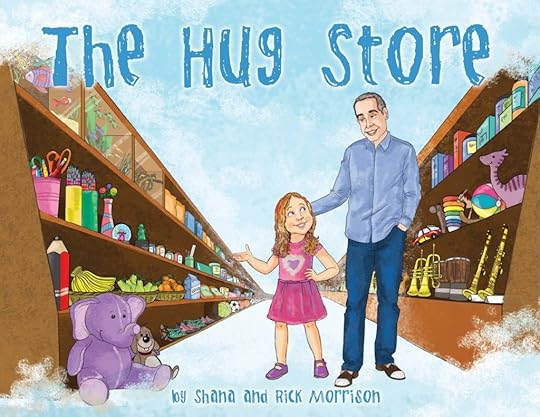
The Hug Store – by Shana and Rick Morrison.
There couldn’t be a more appropriate day, Valentine’s Day, to share this beautiful story about family and the magic of hugs.
As adults, we take hugs for granted. We expect that we’ll always have them at the ready for our loved ones, to comfort a friend in need, to show that we are happy to see someone arrive or show we’re sad that they are leaving. This is the true story of a little girl who thought she didn’t have any hugs left for her beloved grandfather. In this gentle and thoughtful book, Shana takes a journey to locate the Hug Store before realizing that hugs have been deep inside her heart all along.
Much has been written on the benefits of hugging and this story is a great resource for us to open the discussion with our children on what the power of a hug can do for our mind, body and spirit. The book also has fabulous discussion topics for you and your children.
Changing the world, one hug at a time…
Learn more about The Hug Store at www.thehugstorebook.com and hug your loved ones today and every day.
The post Dig Deep Into Your Hug Store Today appeared first on Tools of Growth.
February 7, 2017
Is Emotional Intelligence the Key to Academic Success?

We’ve previously talked why emotional intelligence is so incredibly important as a parenting tool and how it can be used in the home to minimize everyday struggles. But what if emotional intelligence is also the key to academic success?
One of the most cherished dreams of a parent, whether the child is 16 years old, starting kindergarten, or yet to be born, is seeing that child succeed academically. We all want our children to be intelligent, to love learning, to enter college, and to flourish in whatever field they choose. There are industries dedicated to this desire, preschools that are as competitive as the Ivy League, and programs that promise your two-year-old will read. We worry about which teacher they’ll have, whether they’re keeping up in class, and why they’ve become disinterested in school.
But what if none of this mattered as much as being in touch with and productively managing your emotions?
In 2007, Education Week reported an analysis of 207 separate studies by the Collaborative for Academic, Social, and Emotional Learning. The studies, which included over 233,000 children ages 5 to 18, focused on anti-bullying, character improvement, and other topics. CASEL found that, in most cases, the programs worked as they intended and the students “were better behaved, more positive, and less anxious than their control-group peers.” The focus on emotional intelligence had removed the classroom gloom. But additionally and amazingly, those students in the emotional and social programs “had also, apparently, gotten smarter, as measured by their grades and test scores.”
Another nationwide survey of school staff and students found that when “school connections measures go up” testing results and academic achievement also improve. Strong connections and emotional intelligence are not just a way to improve your parent-child relationship, they are a very valuable tool your child can use in school. And unlike simply memorizing the order of U.S. presidents or the names of the longest river on each continent, these are skills that will stay with and support your children through their entire lives.
Dealing With the Feeling allows your child to minimize the overwhelming urgency of strong feelings, whether it’s anxiety, fear, or anger. It can give the child a chance to step back and feel the feeling, then move back into his or her academic work, constructively.
Have you seen how emotional intelligence can support academic achievement?
The post Is Emotional Intelligence the Key to Academic Success? appeared first on Tools of Growth.
January 30, 2017
The Calm, Kind Voice of Reason
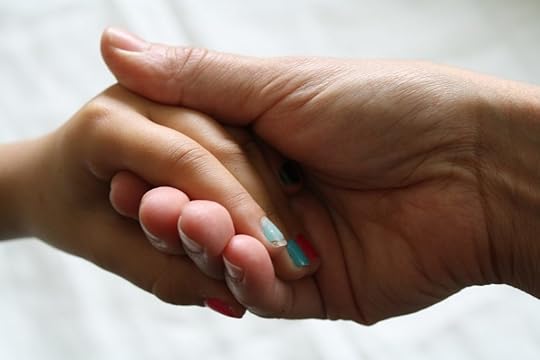
The answers hidden behind a calm and kind Why? – or sometimes a What? or a How? – open the doors to communication. These simple questioning words have the potential to open the minds of both sender and receiver. When parents ask Why? they clearly and directly prompt the child to offer a reason for the behavior. Reason-able Parenting, as the word suggests, relies on a parent’s ability to reason. Prompting reason, discussion, or logical thinking engages the intellect and helps parents gather and understand information. It takes the fizz out of emotions and prevents emotional spillovers that arguments always stir up.
In relationships – particularly between parents and children, where there is a difference in the depth of understanding because of age and life experiences – asking Why? calmly and kindly helps us build a bridge to understanding one another and resolve issues. The energy that parents waste arguing with their children should instead be constructively spent on reasoning and helping kids make sense of the situation. Unreasonable reactions – Because I said so and No means no – are exhausting and detrimental for both parents and children. Using these familiar phrases taxes your relationship.
This holds true in reverse, too: If you aren’t open to answering your child’s Why?, then you can surely expect him or her to go behind your back, hiding things and serving you disappointment and anguish on a silver platter.
Had I been able to reason with my parents, I know that I would not have hidden so much from them or been so dishonest about boys. If they had answered my Why?, perhaps we could have at least reached an acceptable midpoint of understanding. As long as the calm and kind Why? is directed toward the subject of debate (the issue at hand) and not the object of debate (the child), you will be successful at peeling off the layers of emotions and getting closer to an amicable understanding.
The post The Calm, Kind Voice of Reason appeared first on Tools of Growth.
January 16, 2017
Sharing Our Experiences With Our Kids
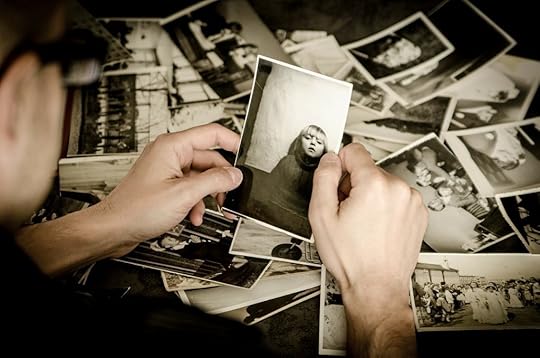
“It wasn’t like that for us.”
Why do we so often tell our stories in a way that our children end up feeling guilty or burdened? I’ve seen this in action in the three generations that have coexisted in our home: my mother-in-law, who is now in her 80s; my husband and me in our 50s; and my children, who are in their late 20s.
“You were born with a golden spoon in your mouth,” my mother-in-law often says to my husband. “It was not like that for us. We immigrated to this country with little in our pockets, and we struggled to give you the comforts that you have today.” When I asked my husband how that made him feel, he said, “My mom always says that! It makes me feel bad. Like they sacrificed their whole life for me.”
Of course we Baby Boomer parents tell our Millennial children, “You are lucky that we were involved and interested in all of your events. You didn’t have to work during high school, you get to pick careers around your passion, and you don’t have the responsibilities of a family or a home yet. It wasn’t like that for us. Our parents hardly ever showed up at our school events, we worked all through high school and took whatever jobs came our way to meet serious responsibilities when we were your age. ”
When I asked my kids how those comments made them feel, my son answered, “It makes me feel guilty. Like you had a tougher life than us.” My daughter responded,
“Why do you guys say that? I’ve talked to a couple of friends about this, and it really makes us feel bad—like you had to have a tough life to give us a good one.”
Yes, it seems each generation has passed down the exact same message: “I struggled; you didn’t. You have a better, easier life than I had. How lucky you are!”
Just the other day, I heard my Millennial daughter say to her 13-year-old cousin— my Generation Z niece—“What! You spent two hours with your mom and saw all your pictures and videos since birth! Lucky you. It wasn’t like that for us. It would take us ten days to dig up all the albums and play all the mini-videocassettes. My parents don’t have footage for my whole life. There are gaps where it is obvious that they got busy and forgot. We don’t have digital footprints like you guys do. Consider yourself lucky! ”
But my clever niece didn’t feel guilty at all. She said, “Well, that’s not my fault. Technology has advanced that much. I’m just part of whatever is in the air right now.”
She’s right. We do become part of whatever is in the air. What we experience depends on the age we grow up in. Each generation focuses on advancement. We all ask, “How can I improve on this? How can I make life a little easier and more efficient?
That is simply human nature. With each generation, as we grow intellectually and emotionally, we change our physical world. That is the nature of life—always in flux, always changing, always advancing. That is the way it is supposed to be. We are supposed to keep growing, changing, and learning. As William Burroughs said, “When you stop growing, you start dying.”
So, parents and grandparents, please think twice about how you share your struggles and experiences with the next generation. Tell your story not with a complaint but with a “Wow, look how much we have grown or evolved. Look at what we are capable of.” This will inspire young children to understand the importance of human potential. It will open their mind to understand the possibility of change, to accept it rather than resist it. With our attitude and choice of words in sharing our experiences, we can either uplift the next generation or weigh it down. Which would you rather have?
The post Sharing Our Experiences With Our Kids appeared first on Tools of Growth.
January 3, 2017
Happy New Year From Tools of Growth!
We wanted to wish all of our supporters a blessed and Happy New Year and to share some of our greatest accomplishments in 2016. Since its launch, our Mindful Play Leader school program (link) has had an impact on more than 20,000 children. Additionally, our book, The “Perfect” Parent, has won three new prestigious awards (link). On the topic of mindful parenting, we were blessed to have shared the stage with Dr. Shefali Tsabary and Mallika Chopra. We also participated in engaging panel discussions with Neale Donald Walsch, Susan Stiffelman, and a variety of other thought leaders and interviewed some of our favorite influencers, including Christine Carter, Tina Bryson, and Suzi Lula with Dr. Nelly Farnoody on Mom Talk, Andisheh TV. It was also an honor to be featured on CBS Los Angeles with Jill Simonian. One of the highlights of the year was meeting Oprah backstage, with Dr. Shefali, at the Supersoul Session in April.
We could not do what we do without the advocacy of our readers, and we are sincerely appreciative for that. Raising children is the most important and, yes, sometimes the hardest job that you will ever do, though it is also the most rewarding. It truly does take a village. While we are honored to be part of that village for your kids, we commend you for your dedication to growing as a parent and as an individual. Wishing all of our Tools of Growth families a mindful and peaceful 2017.
The post Happy New Year From Tools of Growth! appeared first on Tools of Growth.

